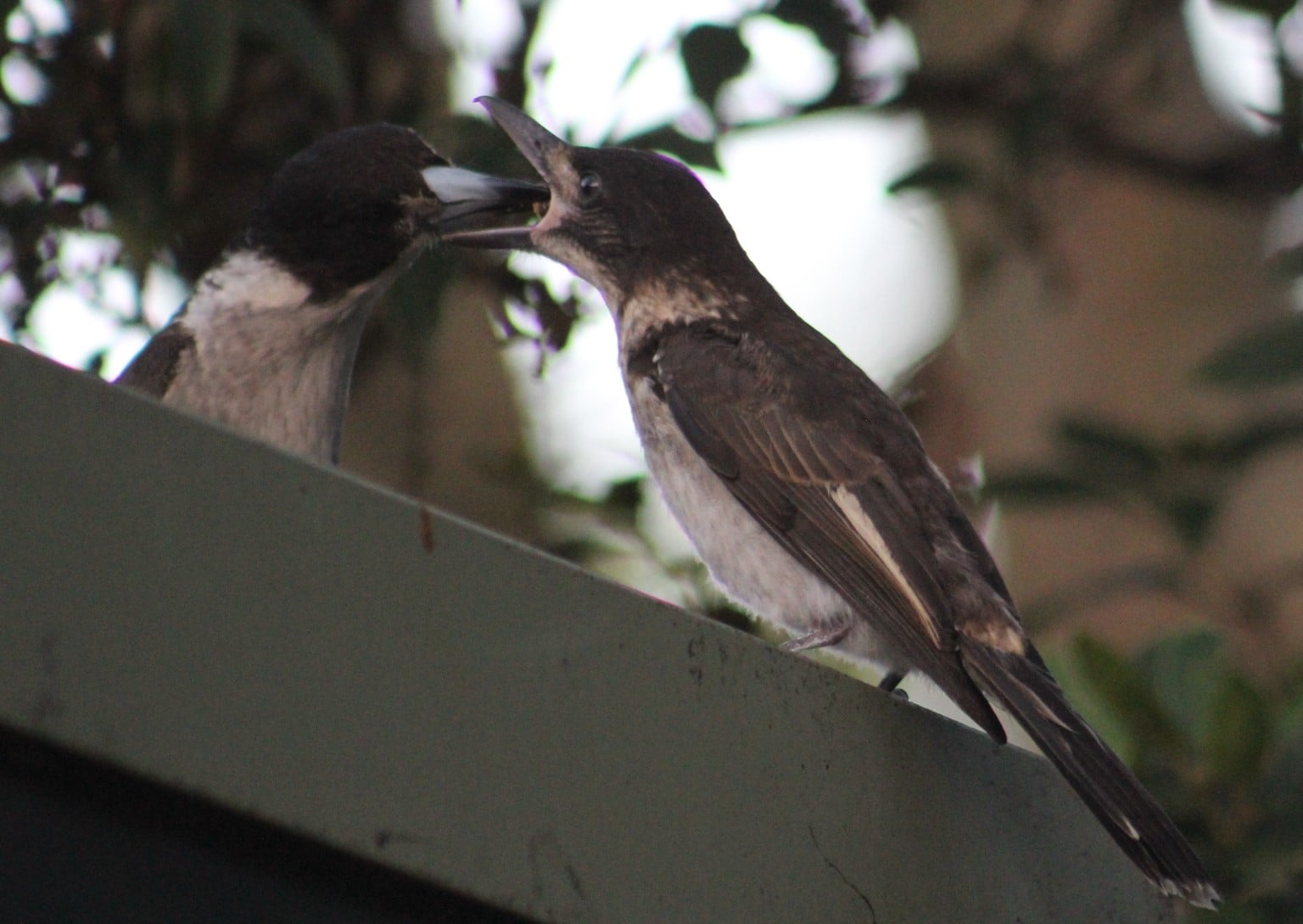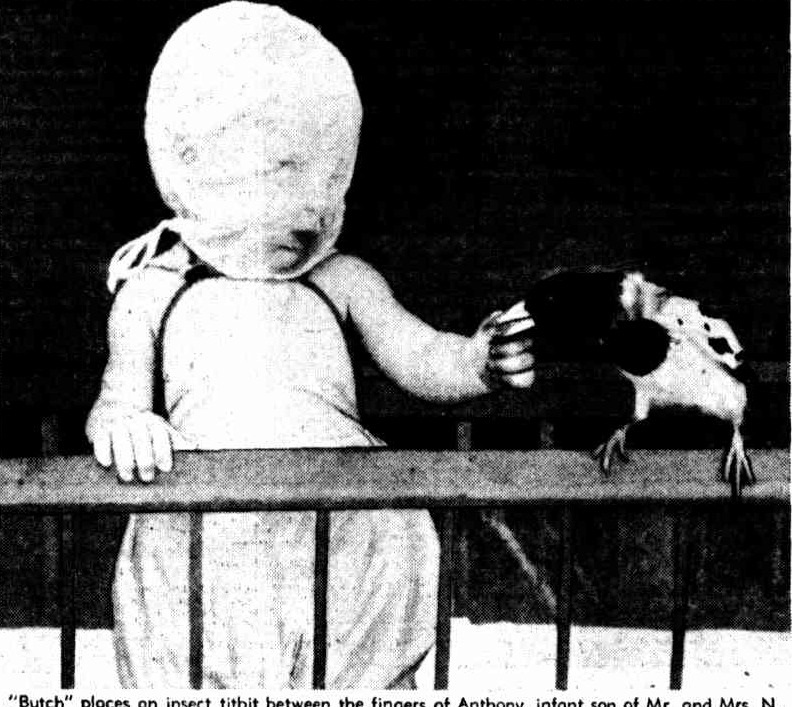January 23-29, 2022: Issue 523
Summer Babies: Butcher Bird + A 1953 Insight On These By Bill Grayden
The pair of butcher birds that live in the Pittwater Online yard have produced two youngsters this season and have been busy feeding the same with cicadas and other insects - it's been getting quite deafening with the sound of cicadas lately, so food enough for them.
What has been great to witness is the way in which the caught insect is shown to the youngster and then placed in a tree branch fork with encouraging noises, teaching the young one how to place their food and then eat it. When the chick leaves the nest it will remain with its mother until almost fully grown. Young Butcherbirds tend to trail behind their mother and squeak incessantly while she catches food. They will stay around for a year and even help the parents bring up the next season’s chicks.

Those that live beside us seem quite used to our presence and allow close observation or will even come to the window to sing their delightful imitation songs of other birds.
They will also feed other 'babies' according to a 1953 report by Bill Grayden.
William Leonard Grayden AM (born Wilbur Ives, 5 August 1920) is an Australian former politician. He was a member of parliament across six decades, serving in the Western Australian Legislative Assembly (1947–1949, 1956–1993) and the Australian House of Representatives (1949–1954). A World War II veteran, he served as a Liberal with the exception of a brief period as an independent. Grayden was a backbencher in federal parliament, but later held ministerial office in the state government of Charles Court (1974–1978, 1980–1982). His brother David and grandfather Nat Harper were also members of parliament.
Mr. Grayden was born Wilbur Ives in Bickley, Western Australia. He was one of three children born to Ethel May Harper and Aubrey Leonard Ives, including his younger brother David who also entered politics. His father participated in the landing at Anzac Cove on 25 April 1915, and lost a lung after being shot by a Turkish sniper. The marriage broke up and his mother gave the children their step-father's surname after she remarried. Mr. Grayden is the maternal grandson of Western Australian businessman and politician Nat Harper.
Bill was educated at state schools and then at Perth Technical College, as part of an apprenticeship commenced in 1938 as a motor mechanic with Winterbottom Motors. He attempted to enlist in the Australian Army when the Second World War broke out in September 1939, but was rejected. He succeeded the following year after lying about his age. Grayden joined the 2/16th Infantry Battalion as a private, but was soon promoted to corporal and then selected to attend Officer Training School in Bonegilla. He served on the Syrian campaign and then in 1942 was sent to New Guinea, where he took part in the Kokoda Track campaign, the Battle of Buna–Gona, and the Markham and Ramu Valley campaign. He ended the war in Borneo and took part in the Battle of Balikpapan. His remarkable expereinces were captured in the book Kokoda Lieutenant (2015). He turned 100 in 2020 and hopefully is still hearing the wonderful songs being sung by this lovely birds.
Below is the item we found:
"Do Try This Scorpion," Said The Butcher Bird
By BILL GRAYDEN, M.H.R.

"Butch" places an insect titbit between the fingers of Anthony, infant son of Mr. and Mrs. N. Guise, at Warrie station. The net over the babe's head protects him from the bird's feeding attempts as well as flies.
Most of us regard the tale of Romulus' and Remus, supposed founders of Rome, as fabulous. But here is a tale, equally fantastic and even more delightful, and-unlike the Romulus and Remus story -fully documented. Western Australia has provided the first authenticated instance of a bird-and a. butcher bird at that adopting a human baby.
Thirty miles West of Roy Hill station and 200 miles south of Port Hedland, is Warrie station. The mile upon mile of mulga scrub of the Murchison has given way to rolling downs and gaunt. red hills. The zone is hot and dry and only spinifex will survive there. The occasional trees, apart from the flood gums in the watercourses, are dwarfed and stunted, but Warrie is regarded as a reliable station. Spinifex, though not as palatable to sheep as mulga and saltbush, is better able to withstand drought. Galahs, white cockatoos and parrots of all kinds abound there, though the arid nature of the country has prevented the intrusion of less hardy birds of the south.
"Butch," an Australian butcher bird, and his brothers are among the few exceptions. Common in the south, and frequently hated by city dwellers for their predatory habits, butcher birds assume a new standing in the north.
Attachment For Man
Regarded by those who know them as the sweetest singers in the. Australian bush, butcher birds have another quality which endears them to bushmen.. They have an unusual attachment for man. Every camp in the bush will almost invariably be regarded as home by a butcher bird. Quiet and trusting and seemingly without fear of the occupants of the camp, they herald the day with the sweetest song of the Australian bush. When the camp is astir and the morning meal is being prepared the most interested spectator is the butcher bird from his vantage point on the nearest tree
Afterwards, when the coast .is clear, he descends to breakfast at leisure on the scraps. He does this methodically and with a studied air. This is his right. He is accepted and encouraged Thenceforth the bird takes his place in the camp life.
Rescued From Death
"Butch," of Warrie station, became part of the family in a rather different fashion. Rescued from death, at the hands of an aboriginal child while still a fledgling, he or she, for the bird's sex is still in doubt, was reared by Mrs. Nick Guise, wife of the station manager. Although allowed complete freedom, he refused to leave the station homestead. For almost two years he remained there, always on hand for the daily call -the call which would send him flying down to sit on the hand or shoulder of Mrs. Guise and accept the titbits that were specially reserved for him. On a diet of insects and household scraps "Butch" grew rapidly. He became a handsome bird with bold black and white plumage and bright, intelligent, inquiring eyes. His friendly, knowing ways endeared him to all.
One day Mrs. Guise returned to the station with a new addition to her family; a son Anthony. "Butch" grasped the significance of the new arrival and reacted in a way which was to make bird history.
Clear Duty
As in the past he had regarded his presence in the household as fitting into the scheme of things, now, without fuss or bother, he took upon himself responsibility for the child. "Butch" did not question what his responsibilities were. A baby required one thing - food. "Butch" was unhampered by scientific notions of child feeding. Around him lay his larder. The regularity with which a baby had to be fed was decided, as far as butcher birds are concerned, thousands of years ago. Deep inside, this one instinct told him what to do. Mrs. Guise walked out of the kitchen next morning to find "Butch" sitting on the baby's head, trying to thrust a soft white grub down her baby's throat. Because of the flies, babies in the North often wear a fly net which covers their heads, unless they are protected by a net over their cot. Thenceforth Anthony always had a net over his cot or a veil over his head.
The Offerings
Many times daily, for the first few days, "Butch" would appear with an insect for the child. Sometimes it was a tasty grasshopper or a juicy centipede, and occasionally a toothsome scorpion, all of them safely crushed. If the baby was left for a moment, "Butch" would be there with his offering, attempting to thrust it into the mouth of the child. When it was not possible to do that, "Butch" would attempt to rake the insect into the hand of the child by drawing his beak through the child's fingers. Though thwarted in his efforts to feed the baby, "Butch" continued his task resolutely.
As the weeks went by "Butch" became aware that the baby was due to be weaned. By this time all young butcher birds should be able to fend for themselves. "Butch" apparently thought that he had now discharged his responsibilities. By tapering off the feeding occasions, the youngster should learn to feed himself. It was clear that "Butch" was satisfied that he had acquitted himself well.
I passed through Warrie station when "Butch" was feeding the baby. When I returned to Perth a few weeks later, I wrote to Mrs. Guise suggesting that, in the interests of science, it would be of value to keep a 'close record of "Butch's"' exploits suggested, among other things, 'that a' chart should be kept of the times each day that ‘’Butch’’ arrived with food for the baby and of what the food consisted. Unfortunately the weaning process had begun and the full record for which I’d hoped did not eventuate.
Mrs. Guise writes thus to me of ‘’Butch’’ whom she assumes to be female
On The Wing
‘’She does not appear to be a fast flyer or to move fast, yet it is amazing to see her pick a fly out of the air as it flies past, without haste or apparent speed. There is no snapping. Her eyesight is marvellous and any small creature moving within a wide radius has little chance against her deceptively slow swoop.
The varied assortment of insects and reptiles which ‘Butch’ brought along would have delighted her own young. After making a peculiar noise, reserved for these occasions, she would retire a short distance, seem very disgusted at her failure, but would finally eat the offering.
Quite undeterred, she continued to try to feed the baby at irregular intervals throughout the day for many weeks. After a time she tapered off, but now, although the boy is eight months old, often arrives with some special luxury such as a small lizard or scorpion. The process is, however, now being reversed and the boy feeds the bird.’’
Departure
I passed through Warrie station again a few weeks ago. ‘’Butch’’ was no longer at the homestead. The station people do not know why he left. They speculate over a cup of tea occasionally as to whether ‘’Butch’ left in search of a mate, or whether it was simply the call of the bush.
At odd times on the run, however, when those who live on the station are crutching or marking lamb or repairing a windmill, a little black and white bird, smaller than a pigeon and with a powerful beak, may appear from out of the shimmering heat and alight on a shoulder or arm. ‘’Butch’’ has never forgotten his friends. He stays a while then flies off about his tasks.
Up Warrie way, people hope that the friendly heart of this little black and white bird will continue to find joy in the sunrise for many seasons to come.
"Do Try This Scorpion," Said The Butcher Bird (1953, February 21). The West Australian (Perth, WA : 1879 - 1954), p. 15. Retrieved from http://nla.gov.au/nla.news-article49081884
They really are the most delightful birds, each with its very own nature, and help keep the garden's insects balance as well as awake us each dawn with their wonderful songs.

Photos: A J Guesdon.